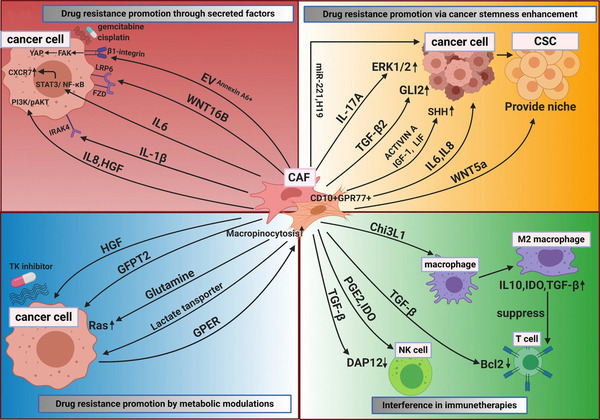- HOME
- News & Events
- Books / review / comments
- 【Books/review/comments】Functional diversity of cancer‐associated fibroblasts in modulating drug resi...
Books / review / comments
【Books/review/comments】Functional diversity of cancer‐associated fibroblasts in modulating drug resistance
February 15 2021
Lab: Takatsugu Ishimoto
Authors: Luke Bu, Hideo Baba, Tadahito Yasuda, Tomoyuki Uchihara & Takatsugu Ishimoto* (*corresponding authors)
Title: Functional diversity of cancer-associated fibroblasts in modulating drug resistance
Cancer Sci 111(10):3468-3477
DOI: 10.1111/cas.14578
Highlights
- Cancer-associated fibroblasts (CAFs) have multiple markers and diversely generated from different precursors.
- CAFs can promote chemoresistance by modulating secrete factors, cancer stemness, and tumor microenvironment metabolism.
- CAFs are also playing an essential role in manipulating immunotherapy.
Abstract
The effectiveness of current chemotherapies for cancer is gradually progressing; however, achieving a complete cure through chemotherapy is still difficult and has been the main goal in treatment of advanced cancer. Drug resistance is an issue in cancer therapy, therefore increasing numbers of investigations into drug resistance have focused on the characteristics of the cancer cells themselves. The interaction between the tumor microenvironment (TME) and cancer cells is also intimately involved in the development of drug resistance. Cancer-associated fibroblasts (CAFs) are a predominant component of the TME and affect tumor progression by secreting soluble factors. This review summarizes the most up-to-date knowledge of CAFs and drug resistance in cancer, with a focus on factors secreted from CAFs including proteins, cytokines, extracellular vesicles, and metabolites. A perspective on the potential role of anti-CAF therapies in overcoming CAF-induced drug resistance is also discussed.

